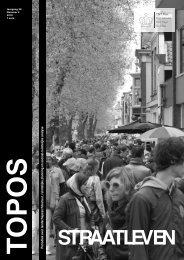Changing public space
Changing public space
Changing public space
Create successful ePaper yourself
Turn your PDF publications into a flip-book with our unique Google optimized e-Paper software.
Figure 3.1 Sign of CCTV in Barcelona, ironically placed on Plaza George Orwell, named<br />
after the author of Nineteen eighty-four, which introduced the famous adagio Big Brother is<br />
watching you (Orwell, 1949)<br />
Jeremy Bentham. He introduced the term panopticum in order to describe a model for the ideal<br />
prison, school, or any other place where groups of people ought to be controlled. The model<br />
presumes that to be able to control people, they should not be put in dungeons, but in places<br />
where they are visible.<br />
Whether CCTV actually makes <strong>public</strong> <strong>space</strong> safer is something researchers do not agree<br />
on. There is evidence that surveillance merely displaces crime: the areas under surveillance<br />
become safer, but the areas not covered by cameras become more dangerous (Koskela, 2000).<br />
Groups that feel uncomfortable being supervised choose to go to places that are outside the<br />
scope of any camera. Because the number of such CCTV-invisible ‘blind spots’ is limited,<br />
violence is sometimes necessary to defend their spot against other ‘outcasts’ (Toon, 2000). In<br />
Birmingham, both the percentage of those feeling safe and those feeling unsafe increased after<br />
CCTV was installed (Brown, 1995). This outcome may be attributed to the presence of CCTV<br />
itself, marking places as dangerous and thereby sensitising people to the possibility of danger<br />
(Atkinson, 2003). Whyte (1988: 4) discovered that panoptical methods do not always lead to<br />
improved behaviour: “… certain kinds of street people get violent if they think they are being<br />
spied upon …”. Although the effect of CCTV is thus questioned, academics all agree upon<br />
the growing importance of surveillance. This not only becomes clear from the large number of<br />
articles addressing the issue, but also the foundation of a new peer-reviewed online scientific<br />
journal called Surveillance & Society that appears four times a year since 2002.<br />
CCTV is not as widespread in the Netherlands as it is in some other European countries<br />
such as the UK and Finland. By 2003, only 20 per cent of all Dutch municipalities had<br />
installed CCTV. It is mostly found in the larger cities: more than 90 per cent of the places<br />
49




